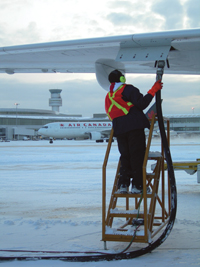
Features
Fuel
At The Gate: A synthetic future
Here’s a carbon reduction initiative that appears to have legs.
April 14, 2010 By Brian Dunn
Here’s a carbon reduction initiative that appears to have legs. Air Canada is among 15 major airlines from around the world that have signed a memorandum of understanding (MOU) to purchase a supply of alternative aviation fuel from AltAir Fuels of Seattle and Rentech of Los Angeles.
 |
These alternative fuels will be more environmentally friendly than today’s jet fuels, according to the Washington-based Air Transport Association of America (ATA) that represents over 90 per cent of all U.S. airline passenger and cargo traffic. The initiative also reinforces proactive steps that airlines are taking to stimulate competition among aviation fuel suppliers and to promote energy security, according to Glenn Tilton, ATA board chairman and United Airlines chairman, president/CEO. Discussions are also ongoing with several other alternative fuel producers, he added.
“Air Canada supports this initiative to develop jet fuel alternatives that are environmentally friendly and economically viable,” said Air Canada spokesperson Isabelle Arthur. “We hope this first step sets a new standard that will one day become available industry wide.”
The AltAir fuel project plans to produce about 75 million gallons of jet fuel and diesel fuel per year by blending camelina oils or comparable feedstock with petroleum-based jet fuel with first deliveries expected in the fourth quarter of 2012. The renewable fuel, to be produced at a new facility in Anacortes, Wash., would replace about 10 per cent of the petroleum fuel consumed annually at Seattle-Tacoma International Airport for example, reducing carbon emissions by about 14 billion pounds over 10 years. Multiply that several times at other airports around the world and you might see a light at the end of the pollution tunnel.
The Rentech project plans to produce about 250 million gallons a year of synthetic jet fuel derived mainly from coal or petroleum coke, with the resultant carbon dioxide sequestered. The drop in synthetic jet fuel will have lower regulated emissions and a lower carbon footprint than traditional jet fuel. Rentech intends to further reduce the carbon footprint by integrating biomass as a feedstock.
Continental Airlines has already conducted a successful Boeing 737 test flight using Jet A fuel, algae oil and jatropha oil. JetBlue has its own test, using an Airbus 320. Whether this alternative fuel supply will save airlines money is still up in the air, according to ATA communications manager Elizabeth Merida. “First, realize that since alternative aviation fuels are not currently commercially available, there are a lot of unknowns. There may not be a cost advantage.” But AltAir believes there will be cost savings. “We believe as crude prices rise and as biomass-derived prices drop because of improvements in yield, efficiencies and scale, our camelina-based fuel will be less expensive than the petroleum version before the end of this new decade,” said AltAir spokesperson John Williams.
“There will be substantial cost savings in fuel to the airlines. Carbon taxes or tariffs will also de facto increase the cost of petroleum fuel, although we don’t know how much or exactly when.” But there’s a limit to how big a market share alternative fuels can capture, Williams added. “At present, the upper level of market penetration from this route (hydrotreated renewable jet) is limited by the upper level of what percentage of biojet fuel can be blended with petroleum jet fuel – 50 per cent. To replace 50 per cent of all jet fuel would require a dramatic increase in feed-oil availability through algae and other vegetable oil sources, including palm, jatropha, canola and soy. Assuming camelina is only grown in fallow-acreage, the narrow supply case of all domestic camelina oil going to all jet-fuel would serve to displace no more than about five per cent of current jet fuel needs in U.S.”
Rentech also believes there will be cost savings for the airlines, according to Julie Dawoodjee, vice president, investor relations and communications, who also expects first deliveries in late 2012. “Our synthetic jet fuel has lower density than traditional jet fuel which could enable aircraft to have a lower take-off weight, which conserves fuel and therefore, lowers operating costs.
“Moreover, our jet fuel reduces aircraft particulate matter emissions by 96 per cent in engine idle, a major source of ground level pollution.”
Brian Dunn is a Wings writer and columnist.